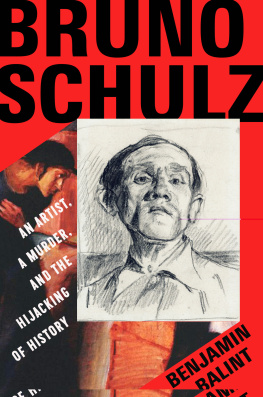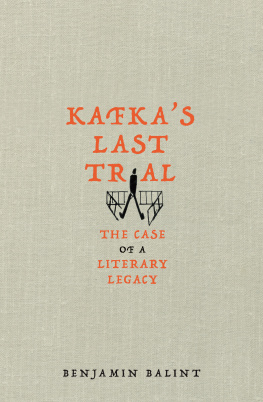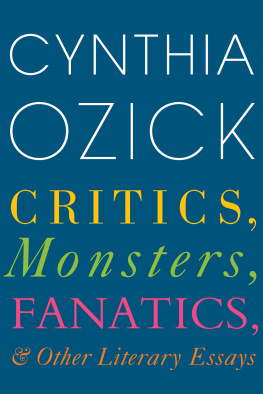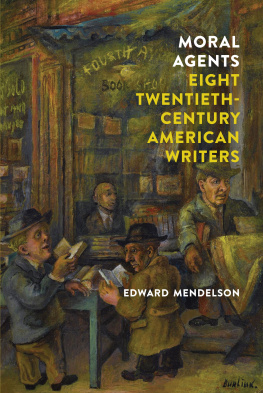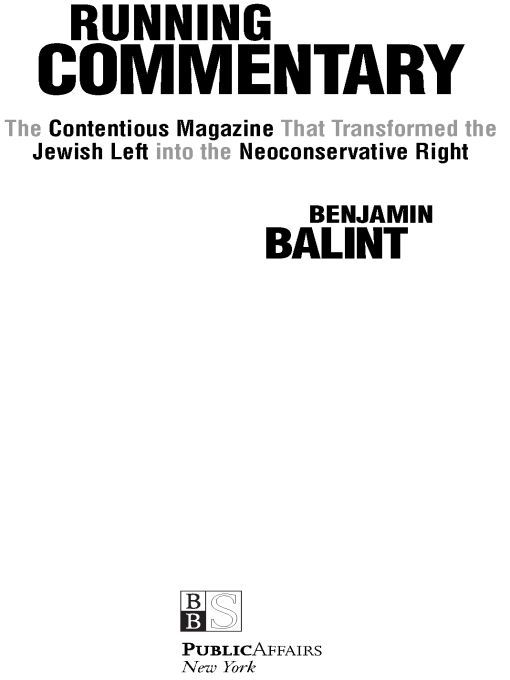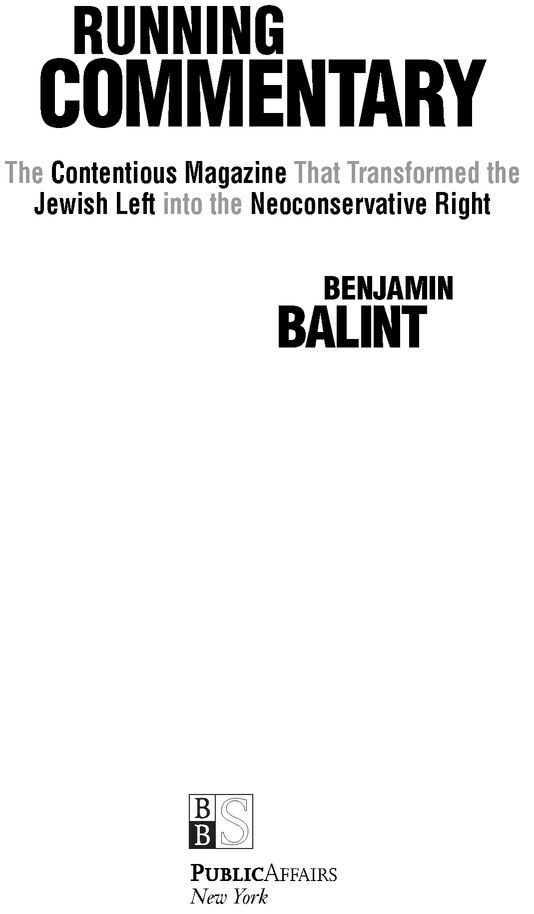Table of Contents
TO ROMY
Seek the welfare of the city to which I have exiled you, and pray to the Lord in its behalf, for in its prosperity you shall prosper.
JEREMIAH
Preface
BY VIRTUE OF THE ARTICLES they had shepherded into print and their long-cultivated habits of mind, the editors of Commentary magazine, the flagship of the neoconservatives, felt well equipped to respond to the attacks of September 11, 2001. On an old, seldom-used television set in the midtown Manhattan office, they watched as Jihadi hijackers, screamers of Allahu akbar, felled the Twin Towers, and the editors knew then that Americas ten-year holiday from history, as columnist Charles Krauthammer called it, was over. The cold war may have been history, but the modes of apprehension it had taught were very much alive. These men were confident that their prestigious magazine of opinion could offerwith a clarity long absent from American foreign policythe most cogent ideological template for the post-9/11 reality. Their contentious, tough-minded monthly, which had for decades wielded an outsized influence on American politics and literature, had long put resolute faith in the fundamental goodness of American power and urged a greater expansiveness and assertiveness in its usesa faith that would now be tested anew. Twenty months before that terrible day, Commentary had run a symposium on American Power. The first of the contributors, published alphabetically, was Elliott Abrams, son-in-law of the former editor and soon to be tapped as an adviser on George W Bushs National Security Council. Preserving our dominance, Abrams wrote then, will not only advance our own national interests but will preserve peace and promote the cause of democracy and human rights. Since Americas emergence as a world power roughly a century ago, we have made many errors, but we have been the greatest force for good among the nations of the earth.
This hadnt always been the magazines credo. In the decades since Commentary came to life just after World War II, the magazine had abandoned the liberal anticommunism of the 1950s for a species of 1960s radicalism, which it in turn rejected for the neoconservative sensibility of the 1970s and after. Through both apostasies, the magazines political passions endured, as did the polemical style in which these passions were so forcefully expressed. Commentarys first editor, Elliot Cohen, presided over a group of defectors from socialism who articulated in the magazines pages a strong case against Communist tyranny. As he traveled the road of self-creation from Brooklyn obscurity to uptown respectability, Norman Podhoretz, the second editor, first steered hard left into fashionable 1960s radicalism, and then, in revulsion against the excesses of the politics with which he himself had flirted, he threw the tiller the other way and made his magazine host to the much-castigated neoconservative cold warriors. In veering into its neoconservative phase, Podhoretzs Commentary sharpened old divisions and created new ones as it helped advance the rise of a powerful new Right from the remains of the old Left and redefined the role of American power at the very time that power was reaching its zenith. The third editor, Neal Kozodoy, in filial fidelity to his predecessor, guided the neoconservatives from the cold war to the war on terrorfrom World War III to World War IV, as they would saylaying along the way the intellectual foundations for the Bush Doctrine and the wars in Afghanistan and Iraq, the countrys biggest foreign ventures since Vietnam. A once marginal group of ex-leftists found that their ideas were extraordinarily relevant to the country at large. Their quarrels had foreshadowed larger political shifts; their ideas had become the politics of governments; their preoccupations had become the countrys.
A magazine is always a date, an issue, a moment, literary critic Alfred Kazin once wrote in Commentary; it is created out of an exacting sense of time. Throughout its long life, Commentary registered the life of its times. It looked intently at America, and it offered a running commentary, for lack of a better term, on the decisive moments in postwar American life: from the cold war and the lasting effects of Europes totalitarianism on American politics, to Vietnam and the counterculture, to 9/11 and the war on terror. Commentarys story, in other words, bears closely on the life of the nation during the last sixty years.
And yet this American drama was all the while enacted on a Jewish stage. Commentary was founded, after all, by the American Jewish Committee in 1945 to meet the need for a journal of significant thought and opinion on Jewish affairs and contemporary issues. For the eloquence with which it did so, there was none to compare. The same magazine that would host the neoconservative ascendancy ran the early fiction of Philip Roth, Bernard Malamud, Saul Bellow, Isaac Bashevis Singer, and Cynthia Ozick, as well as the powerful literary criticism of Lionel Trilling, Alfred Kazin, and Irving Howe. In essays of the highest distinction, Commentary grappled with the Holocaust, the birth of Israel, and the Six-Day War. Its pages were the first in America to feature The Diary of Anne Frank. It published incandescent essays on Jewish theology by Gershom Scholem and on Jewish nationalism by Hannah Arendt, not to mention Norman Mailers six-part series on Martin Bubers collection of Hasidic stories. Over time, the magazine, fascinating in itself, became one of the most important journals in Jewish history, an incomparable barometer of the climate Jews came to enjoy in America. Commentary was deeply representative in some respects and deeply unrepresentative in others, but either way it registered Jews negotiations with America and the complications and conundrums thereof
What did the magazines political trajectory have to do with the curve of its Jewish arc? By what alchemy had a liberal magazine, founded by marginal, disaffected, ex-radical children of immigrantsalienated from the Jewish tradition and America alikebecome the bible of neoconservatives? Therein hangs an unusual but most instructive tale.
PART I
Outsiders
Loneliness
Exiled, wandering dumbfounded by riches,
Estranged among strangers, dismayed by the infinite sky,
An alien to myself until at last the caste of the last alienation.
DELMORE SCHWARTZ, ABRAHAM
IMMIGRANTS
The Jewish encounter with America began with two dozen refugees setting foot in New Amsterdam, the city on the Hudson River soon to be renamed New York, in 1654. No red carpet greeted them. Governor Peter Stuyvesant wished these members of what he called the deceitful race and blasphemers of the name of Christ to leave. He was overruled by the directors at the Dutch West India Company in Amsterdam. The newcomers stayed and were soon joined by brethren who established communities in Philadelphia, Newport, Charleston, and Savannah.
A hundred or so American Jews fought in the Revolutionary War on behalf of a country unique in history, a country that from its very inception guaranteed the free exercise of religion. In the not-so-distant past, the Jews of Europe had lived at the whim of their hosts, who couldand didrevoke Jews residential rights at any time. Jews had been expelled from Vienna in 1670 and from Prague in 1744. They were commonly seenand saw themselvesas temporary settlers, as tolerated strangers. Resigned to political powerlessness, they learned to dwell in Jewish tradition itself, poet Heinrich Heine said, as a portable homeland. George Washington, by contrast, assured the Jews of Newport that the U.S. government, dedicated to religious tolerance, gives to bigotry no sanction, to persecution no assistance.


